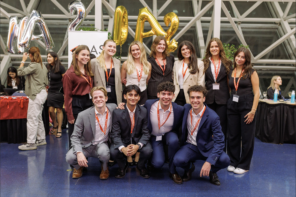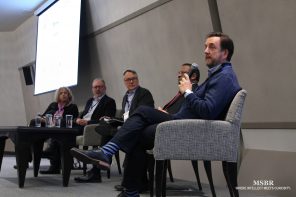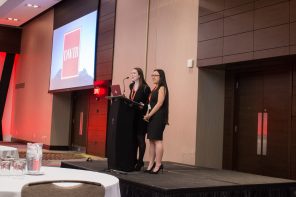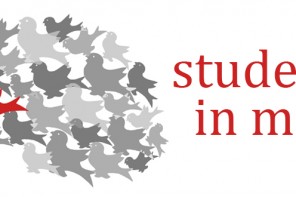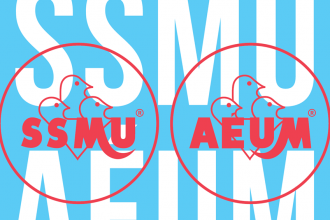
JULIA RODRIGUEZ
News Writer
On Wednesday, the McGill African Student Society (MASS) hosted Focus on Africa: Congo Week Conference McGill 2013. The conference informed the McGill community of the atrocities that are currently taking place in the Democratic Republic of Congo (DRC), and provided a platform for students to discuss the West’s influence in Africa.
Keynote Speaker Patrick Mbeko, author of Le Canada Dans Les Guerres en Afrique Centrale (Canada in the Wars of Central Africa), attempted to unravel the web that is the West’s interest in the Congo. Particularly, he highlighted Canada’s role in the conflict.
It is estimated that between 6 and 8 million people have died in the Congolese crisis since 1990. “This is equivalent to the population of Quebec, just disappearing,” Mbeko pointed out. He attributed such violence to warring militia groups. “[These groups are] funded by western mining interests,” he asserted. “75 percent of which are Canadian, and are traded on the Toronto Stock Exchange.”
Mbeko argued that Canada, working with the United States, has drafted illegal mining contracts with puppet governments in the DRC that have fueled a bloody inter-ethnic battle for resources. Such illegitimate contracts allow miners access to the Congo’s rich resources.
By some estimates, the DRC’s natural resources are valued at $3 trillion. While the Congo was once mainly known as a supplier of rubber to Colonial Belgium, today coltan mining is its most significant industry. 70 percent of the world’s coltan, a mineral commonly used in electronics, is produced in the DRC. According to Mbeko, the massive demand for coltan has led to the growing use of child labor in mines. “Every time you hold an electronic device think of the children who work in the mines,” he asserted.
Furthermore, Mbeko revealed that mining companies fund armed groups such as the M23, the Democratic Forces for the Liberation of Rwanda, and the National Congress for the Defense of the People to promote “a policy of chaos.” This keeps the nation in a permanent state of unrest, allowing them to further exploit the DRC’s natural wealth.
Mbeko emphasized the significance of commercial motivations for war. “There aren’t tribal wars in Africa, there are economic wars,’ he claimed. “You will never find a conflict on this scale in a poor African nation.”
What Mbeko found most disturbing about the Congolese Crisis is the lack of media attention it receives. “Powerful sources have fought to keep this information from the public domain,” Mbeko said, quoting American Congresswoman Cynthia McKinney. “The West has plundered Africa’s wealth at the expense of Africa’s people.”
The Conference’s Project Manager, Melanie Nancy, hoped to remediate this lack of public knowledge. “We are hosting this event to raise awareness of what’s happening in the Congo,” she explained. “No one is talking about it.”
Raising awareness is part of MASS’ larger aim of educating the McGill community about African politics and culture. MASS also acts as a support system to African students, as well as those who are interested in its culture, to ensure that students do not lose a sense of cultural identity during their time at McGill. “It is important that we bring together the African community and bring a piece of it here to McGill,” Nancy said.
MASS does not limit their efforts solely to the McGill bubble, but often collaborates with Concordia and UQAM to host events that engage both university students and Montreal at large. MASS throws an annual Gala, but hopes to bring their message to a wider audience by hosting more events and by covering a greater variety of topics. The Focus on Africa Conference is part of this renewed effort.
“I came here to get some more information,” noted Catherine-Laure Juste, Arts U2. “I’ve always been interested in the relationship between the DRC and Canada so I thought, why not?” It also attracted a group of students from STAND, a McGill student organization that works to prevent the illegal and abusive extraction of minerals in the DRC. First year, May White-Vilmouth, a member of STAND, was there to learn more. “I just joined the club and came to get a better understanding of the situation,” she added.
Although MASS has no further initiatives planned in response to the conference, organizations such as STAND are ideal for students looking to get involved.
Mbeko highly encouraged student and community mobilization to promote awareness and stimulate meaningful social growth in the Congo. Mbeko said he is hesitant to leave justice to international organizations such as the International Criminal Court (ICC). “The reality is that international justice does not exist,” he claimed. He instead encouraged grassroots efforts both in the West and the DRC to demand accountability for mining companies and militants.
During the conference’s accompanying student panel, MASS’s Former VP of Education, George Frederic Kewnituga Kibala-Bauer advocated instead for greater respect for Congolese sovereignty. “We must encourage the development of inclusive institutions to promote the Congolese economy,” he noted. “It is up to the people of the Congo to decide what their institutions and their country will look like.”
Galen Osterman, President of the International Criminal Court Student Network McGill Chapter also sat on the student panel, and defended the role of international law. “The ICC may not be a perfect institution but if we didn’t have it we would need to create it,” he asserted. “Democracy and the ICC should go hand in hand.” He emphasized that the ICC can hold perpetrators of violence accountable but only if the Congolese ask the court to do so.
Mbeko closed the evening with a final appeal for justice. “I speak to you as a Canadian, as a Quebecois, as a Congolese, as an African, but most of all as a global citizen. We must fight for justice. We can break the silence about what’s happening in The Congo.”

